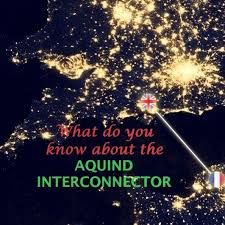AQUIND Interconnector
 | |
The AQUIND Interconnector is a proposed high-voltage, direct current (HVDC) submarine power cable proposed to link France and England.[1] It has faced local opposition and attracted controversy due to links between the company's backers and the Conservative Party.[2]
On 13 December 2021, Led By Donkeys tweeted a video:
"This is a story about a £1 billion undersea power cable that developers want to build in Portsmouth." (More than 1.5 million views so far for this look at Boris Johnson’s government and the state of our democracy.)[3]
Own words
AQUIND Interconnector will link the British and French electric power grids to make energy markets more efficient, improve security of supply and reduce carbon emissions.[4]
Route
The cable would run between the Lovedean substation in Hampshire in England to the Barnabos substation in the Normandy region of France. Landfall is proposed at Eastney in Portsmouth (UK), and Le Havre (France). The route is 242 km (150 miles) long, with 187 km (116 miles) under the sea, 25 km (16 miles) on land in the UK and 30 km (19 miles) on land in France.
Specification
The HVDC link would consist of four main cables, together with two much thinner fibre optic cables for operational control and communications. HVDC involves lower transmission losses than the conventional alternating current (AC) technology used in most existing electricity networks. Land cables would be laid mainly under existing roads to minimise the environmental impact of the development.
The link would be built as two separate 1,000 MW circuits, each with their own control and protection systems and auxiliary power supplies. The DC circuits would run at 320 kV, and operate as symmetrical monopoles. The project is expected to cost £1.1 billion.
History
When the project was announced in June 2016, the company said that the project would come online in 2021.
In July 2019, Portsmouth Council formally objected to the plans, on the grounds that it would cause unacceptable disruption in a built-up area. Between February and April 2019, the company undertook a statutory consultation exercise. In November 2019, AQUIND submitted a formal planning application for the link in the UK.
In June 2020, AQUIND submitted to Ofgem and the Commission de Régulation de l'Energie (CRE) a request for partial exemption from Articles 19(2) and 19(3) of Regulation (EU) 2019/943 concerning Use of Revenues obligations, for a period of 25 years from the start of commercial operations. In December 2020, Ofgem and CRE published a joint consultation document; this consultation was intended to close on 29 January 2021. In January 2021, the CRE and Ofgem announced that they had discontinued a public consultation for the AQUIND Interconnector, as this exemption request process is only available to interconnector projects developed between EU member states, the UK ceased to be a member state and the Brexit transition period had ended.
In October 2020, there was a protest against the project in Portsmouth.
In November 2020, AQUIND won an appeal in the General Court of the European Union against the Agency for the Cooperation of Energy Regulators’ (“ACER”) decision to reject an application for exemption pursuant to Article 17 of Regulation (EC) No 714/2009.
On 26 January 2021, the French authorities in Normandy refused to give the project the green light.
In March 2021, the examination by Portsmouth City Council closed.
In May 2021, there was another protest in Portsmouth. Conservative MP Penny Mordaunt called the proposals “sinister”. Labour MP Stephen Morgan also voiced his opposition. The following month Mordaunt handed in a petition against the project. Another protest was planned for July 2021.
A final decision by the British government to permit construction has been postponed several times. On 21 October 2021, the business secretary Kwasi Kwarteng set a new deadline of 21 January 2022 for deciding on the planning application.
After the decision in January 2021 by the French regional government in Normandy to refuse permission, the company stated that this "does not prevent AQUIND from securing the relevant French planning consents required to construct and operate AQUIND Interconnector."
In October 2021, after growing criticism, the company vowed to "continue the development of the AQUIND Interconnector project."[5]
Controversy
Campaigners and local MPs have urged the cancellation of the project. The Portsmouth MP Stephen Morgan claims that the cable and its associated data connections pose a risk to UK national security.[6] The Guardian newspaper reports that the promoters of the project, Viktor Fedotov and Alexander Temerko, are both substantial donors to the Conservative Party and MPs, and that "three Conservative ministers have already had to recuse themselves from the decision-making process over the AQUIND undersea cable because of their links to the company."[7] Almost 10% of MPs have received donations from companies linked to Fedotov. The minister and peer Martin Callanan was a former director of AQUIND and another peer, James Wharton is a consultant to the company.
In October 2021, AQUIND vehemently denied any wrongdoing, and stated that it would "not stand silently and accept slander based on xenophobia and the principles of guilt by association." The company stated that it was considering taking legal action against the media involved.[8]
References
- ↑ https://www.4coffshore.com/transmission/interconnector-aquind-interconnector-icid161.html
- ↑ "Russian tycoon’s link to alleged corruption in leaked files raises questions for Tory ministers"
- ↑ "This is a story about a £1 billion undersea power cable that developers want to build in Portsmouth"
- ↑ "AQUIND Interconnector will link the British and French electric power grids to make energy markets more efficient, improve security of supply and reduce carbon emissions"
- ↑ "Tory donor takes control of firm seeking UK approval to build cross-Channel cable"
- ↑ "Aquind Cross-Channel cable a security risk, says MP"
- ↑ "Anne-Marie Trevelyan ‘risked misleading parliament by omission’ over energy project lobbying"
- ↑ "AQUIND Refutes Recent Allegations in the Media"
Wikipedia is not affiliated with Wikispooks. Original page source here